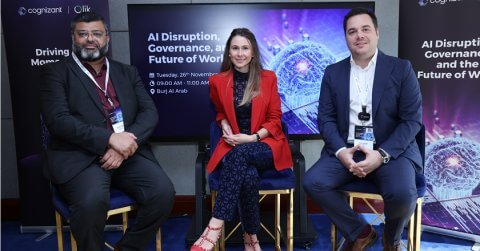
Dubai — The UAE stands at the forefront of integrating artificial intelligence (AI) into its socio-economic framework, indicating a transformative phase in its developmental strategy. The appointment of the world’s first AI minister in 2017 underscored the UAE’s commitment to leveraging AI for national advancement. This strategic focus drives substantial investments in AI across various sectors, with the goal of enhancing operational efficiencies and fostering innovation. The nation’s distinctive approach prioritizes AI adaptation in critical areas while ensuring that these technologies align with the broader vision of sustainable and inclusive economic growth. Kelly Forbes, Executive Director of the AI Asia Pacific Institute and AI Advisory Council Member at Qlik, spoke to Sandhya D’Mello, Technology Editor, CPI, on the growing adoption of AI and how it will shape future trends fuelling economic growth.
Could you please provide your insights on the current global trends in AI adoption, with a particular focus on how the Middle East is positioning itself through investments in AI?
The current global trends in AI adoption are witnessing a dynamic phase, characterized by robust investments and strategic policy frameworks. In particular, the Middle East is showcasing a proactive approach through substantial investments aimed at fostering AI integration across various sectors. Estimates suggest that AI could contribute approximately $320 million to the Middle Eastern economies, underscoring the significant potential it holds for this region. The UAE, in particular, is spearheading these efforts, tailoring AI applications to meet its unique socio-economic requirements. The region’s focus on aligning AI strategies with local needs, alongside developing appropriate regulatory measures, is crucial for facilitating a smooth transition into an AI-enhanced future. This strategic approach not only aligns with global technological advancements but also ensures that the benefits of AI are optimized to meet the specific demands of the Middle East.
As we approach a decade since the UAE appointed the world’s first AI minister, how do you view the country’s role in leading AI innovation? As an AI enthusiast, what are your thoughts on the UAE’s technological advancements?
I believe it speaks volumes that the UAE was the first government to appoint a Minister of AI. Clearly, this demonstrates a strong commitment from the government to not only showcase the potential of AI but also to integrate it in a manner that supports their ambitious strategy. They are focused on specific key sectors they wish to enhance through AI development. It’s undoubtedly an exciting place to be.
For anyone who has been in Dubai in recent years, it is evident how rapidly it is transforming, largely due to the openness towards technology and AI.
What strategic priorities should Middle Eastern countries focus on to ensure they are not just consumers but also innovators in the AI space?
This is a critically important question because it encapsulates two perspectives. First, the approach is not merely a ‘copy and paste’ exercise; the UAE has specific needs and priorities that may differ significantly from those of other parts of the world, such as Asia or the US. While the US and China are currently the major powers in AI, other countries, particularly the UAE, possess distinct advantages as well. One of these is its geopolitical neutrality, which allows it to foster unique developments in AI. Furthermore, the UAE government has made significant investments in education. For instance, they have established a university dedicated solely to AI, reflecting their innovative approach to integrating research, innovation, and technology. This approach is commendable and appropriate, considering global developments in AI.
In your role at the AI Asia Pacific Institute, you emphasize the importance of an ethical framework in AI. Could you discuss the key elements that should be included in these frameworks to ensure transparency and accountability in AI applications?
I have proposed several guiding questions as we consider what we might define as responsible AI. This process involves thinking about how we can innovate responsibly, ensuring that the development and adoption of AI proceed smoothly. One critical question is whether we have someone on the senior leadership team or on the board who can guide this process. It is essential to focus on opportunities and consider potential risks. For example, collaborating with Qlik on this front has been beneficial. Qlik is one of the first companies to carefully consider the role of the AI Council, which brings together individuals from diverse backgrounds to guide the company. This council facilitates discussions from different perspectives, including policy and research, to mitigate potential implications effectively.
What are AI Asia Pacific Institute’s plans for the region in 2025?
We are currently focused on bridging the gap between the potential of AI and its realization. To achieve this effectively, we are deeply involved in formulating policies and developing infrastructure to ensure a critical and sustainable transition. In this context, we have extensively considered the Asia Pacific region, specifically Southeast Asia. For instance, we undertook a project examining Southeast Asian countries, where Singapore stands out as a robust economy while many other nations in the region are somewhat lagging behind. This raises questions about their strategic positioning in this technological space. Similarly, when we consider the Middle East, particularly the UAE, it is crucial to recognize the region’s unique attributes. The UAE’s leadership position is akin to Singapore’s, guiding the rest of the region in technological development. The UAE is not only embracing technology but also meticulously crafting the necessary policies and infrastructural frameworks to support this advancement.
Given that AI is poised to revolutionize job markets, what impact do you foresee on employment in the Middle East? Which sector do you believe will be most affected?
We know that disruption is already occurring across various sectors, particularly in tasks that AI can efficiently manage, such as administrative duties. As AI technology becomes increasingly capable, we anticipate significant changes in the job market, with some existing jobs becoming obsolete. Concurrently, AI is creating new job opportunities. In response to these shifts, it is imperative to prepare the population for upskilling, enabling them to perform future jobs. Additionally, the education system must adapt to these changes. This adaptation is not solely the responsibility of the government; it requires a multidisciplinary approach. Both the private and public sectors must collaborate, deliberating on their roles in facilitating this transition.
What re-skilling strategies do you recommend for current professionals to remain relevant in their fields? How can educational institutions and governments best support this transition?
The skills that will be required in the future may differ significantly from those we currently teach. We need to consider soft skills—how to prepare individuals to adapt and become more creative, especially in working with AI. It’s crucial to understand how to use AI effectively, how to collaborate with it, and how to evaluate its outputs when they may not be accurate critically. Education and upskilling play a pivotal role in this context, and we observe that many technology companies and governments are increasingly active in this area.





